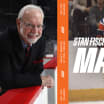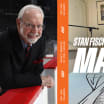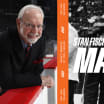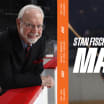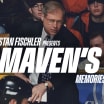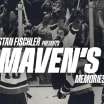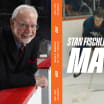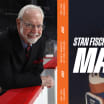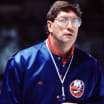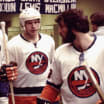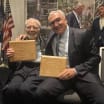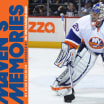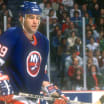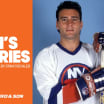For General Manager Bill Torrey, acquiring Kallur felt like stepping out of a delicious dream.
"By 1979 we had a formidable outfit," said Bow Tie Bill. "The defense was set with Johnny and Denis Potvin, Dave Langevin, Stefan Persson, Bob Lorimer, Dave Lewis and Mike Hordy.
"But I knew there were still gaps to fill up front. After Bryan Trottier we weren't as strong as I'd have liked, so I was always looking around for help. That's when we were fortunate enough to land Anders."
Maven's Memories: The Shorthanded Swede, Anders Kallur
Kallur holds the Islanders record with 19 shorthanded goals
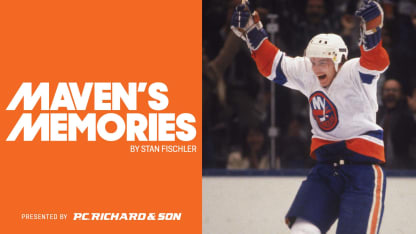
By
Stan Fischler
Special to NHL.com
The Isles boss already had a jump on his rivals; he was mining the mother lode of Swedish talent before any other NHL leader. Backliner Persson had blossomed into a formidable two-way asset and now Kallur would do likewise on the attack -- with an assist from Persson.
Kallur: "Stefan told me in advance that the Islanders were a good organization. He said that they didn't make a lot of trades and that they treated him very well. Also, they were winning; and that didn't hurt my thinking one bit."
Following the 1978-79 season, Anders was named the most valuable player in Sweden and at 27 years he came to Uniondale with a ton of experience.
"Anders gave us several options," said Torrey. "Although his usual position was right wing, he had played a lot of center and even some left wing. He gave us the kind of versatility a good team should have."
MAVEN'S MEMORIES
WRITTEN COVERAGE
Stan's Fans: The Amazing Polatoffs
Billy Smith's Origin Story
Butch Goring's Wise Words
Garry Howatt: Toy Tiger
King Kvasha
How 50-in-50 was Born
Trottier Wins Hart Trophy
Behind the Scenes with Bryan Trottier
Maven's Haven
The Islanders autumn 1979 training camp was clouded with doubt. After being upset by Toronto in the 1978 playoffs and then having been defeated by the Rangers in the 1979 post-season, the franchise needed a positive turnabout.
"No question," said Torrey's right-hand-man, Jim Devellano, "the fans wanted more than what we were giving them and we wanted more out of ourselves. We believed that Kallur would help pull us out of the funk. He wound up doing even more than we thought he could."
Actually, the Bruins originally had Anders on their roster but failed to grasp his potential. It was then that Bow Tie Bill moved in and, poof, just like that, the Bruins' loss was the Islanders gain.
"After the Bruins sent him back to Sweden," said Torrey, "he became a free agent. He was on his way to sign with the Hartford Whalers when I took him out to lunch and signed him.
"Did I have any concerns? At one time the thinking was that over an 80-game schedule Swedish players wouldn't stand up but I learned that they adjusted to the NHL better than players from other European nations."
When Anders stepped on training camp ice for the first time, he experienced a normal rookie's anxiety and quietly felt his way around until he could be reasonably comfortable.
"I didn't have the experience the rest of the guys had," Kallur remembered, "or the disappointment they felt from the year before. I hadn't experienced NHL hockey before, so I was very focused on making the team.
"I didn't talk to the players much about the year before and losing to the Rangers. But the feeling I got was that they were all very hungry to win and to prove themselves. That was the feeling I had, too, because I was trying to make the team.
"So, it was good for me. They had something to prove and I had something to prove. It made me feel a part of things."
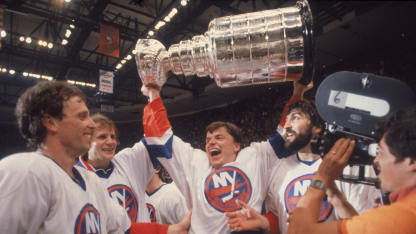
© B Bennett/Getty Images
Training camp was anything but a snap. Competition was keen and veterans "tested" Kallur to make sure that he was tough enough to play major league hockey.
Kallur: "I was so motivated to make the team, I didn't notice if the guys were playing any differently toward me. I was so concentrated on my job, it never occurred to me."
The fact that fellow countryman Persson already was an Isles fixture helped Kallur no end. Anders had someone to talk to and explain what Islanders hockey was all about.
Anders enjoyed a good 10 days of camp and then pulled a groin. Management believed he could recover with a short stint on the Indianapolis farm club. He did that without a whimper and when he returned to Uniondale he was an Islander to stay.
"The best thing that happened after that," chuckled Kallur, "is that I scored a shorthanded goal against Montreal. I began to feel like I belonged."
One goal does not secure a varsity spot but the general staff saw enough good things to feel confident that this freshman had the goods.
"I can remember how Anders impressed me early in camp," said Arbour. "It was his all-round athletic ability. One example was when we played some fun soccer. Oh, boy, what a terrific soccer player he was; with great instincts and competitiveness. He also was an excellent tennis player. Just a superb athlete.
"But, at the same time, I told Andy I wasn't going to rush him. Still, by the time we reached the March homestretch of his rookie season he had become one of our best forwards."
It didn't take Kallur long to "get it." And to really get it in Radar's estimation was to play the 200-foot game. Anders never failed in that regard as well.
Torrey: "My interest in Anders was not only in his goals and not merely in statistics; but it was the way he could play defense; the way he played the intelligent game and how he helped kill penalties."
What intrigued both foes as well as the Met Area media was how Torrey & Company managed to find these swift Swedes. Pulling in one ace was regarded as not too bad; but with Kallur as the second winner, the question zeroed in on the mysterious Isles scout who discovered the pair.
When Torrey was cross-examined on the subject, Bow Tie Bill shot back with a, "Mum's the word!"
Then, a pause and the GM added: "All I'm gonna tell you is that he has other duties in Swedish hockey. He prefers to do it on the quiet. I talked to him on the phone maybe two or three times during the season. But a couple of our other scouts talked to him every week or two weeks. What I will tell you is that the fellow who found Kallur is a full-time scout."
In a sense, Anders -- in turn -- helped unearth yet another Swedish defender who would wind up with a pair of Stanley Cup rings. That would be Tomas Jonsson.
"I remember Tomas when he was only 11-years-old," said Kallur. "He was playing 'Midget' hockey in the city of Falun and my brother, Ollie, and I coached that team. It was easy to be Tomas' coach. When our team was in trouble, I told him to go out and score a couple of goals. He eventually wound up being the best guy on the national team before he came to the Islanders."
Kallur didn't win the Calder Memorial Trophy as rookie-of-the-year in 1979-80 but over a period of 76 games his collection of 22 goals, 30 assist and 52 points proved that he belonged in the bigs.
"One of his issues," said Torrey, "was adjusting to the smaller rinks. In Sweden he was playing on surfaces that were 100-by-220 feet. When he played in Boston Garden or the Aud in Buffalo, it was 85 by 185. That was a huge difference."
None of that stuff produced a sophomore slump. The more Anders played, the more he improved. A year later he progressed to a 64 point campaign (36G, 28A) plus an impressive playoff comprising a dozen games, with four goals and seven assists. Kallur's adaptability was one of his top assets. Coach Arbour had no qualms playing him on left wing with Mike Bossy and Bryan Trottier. On other occasions he worked alongside Butch Goring and Bob Bourne.
Radar also played Anders on the power play as well as his penalty-killing unit on which he became a shorthanded scoring threat, During a game against the Whalers, he was on PK patrol when he snatched a rebound near the Isles goal. Somehow he spotted Trottier on the other side of the rink. He skimmed a cross-ice pass that catapulted Bryan free for a breakaway goal.
"It was Andy's anticipation that made it possible," asserted Trots. "The only way I got free was if he reacted with the puck; which he did. That was not a normal play."
Kallur's most impressive playoff was delivered in 1983, coincident with the Islanders fourth consecutive Cup. Over a 20-game span, Anders totalled 15 points (3G, 12A).
Historian-author Andrew Podnieks took note of Kallur's value in the definitive book, "Players -- The Ultimate A-Z Guide." Podnieks but it this way:
"Kallur was one of the reasons the Islanders won four straight Cups. He gave the team speed from the right wing and scoring ability. By the time Anders retired he was the all-time leader on the team with 19 shorthanded goals. That was a testament to his offensive abilities and defensive reliability."
Looking backward to his rookie season, Anders allowed that nothing ever was "in the bag" as far as he was concerned. Father Failure always lurked in the background, but Kallur's consistently superior play kept him there. From the beginning to the end, Anders never was heard singing the blues.
"Coming to the Islanders," he concluded, "was a challenge to me. In the end, I'd have to say that the results were very satisfying. And I say that not only for me but for my countrymen, Stefan Persson, who preceded me and set an example and, of course, Tomas Jonsson, who followed.
"Each of us could rightly say that we succeeded with the Islanders and the Stanley Cups we won speak for themselves."

